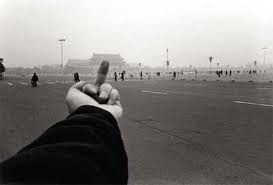 Photo by Ai Weiwei
Photo by Ai Weiwei
Renowned Chinese artist Ai Weiwei was detained on April 3 at Beijing Capital Airport by customs police while trying to travel to Hong Kong following three police visits to his studio last week. Now there are reports from police authorities late Wednesday that they are investigating Ai Weiwei "for suspected economic crimes in accordance with the law." Following the arrest, police searched his studio and his wife’s home and arrested his wife, his friend and former journalist Wen Tao, and eight of his employees, freeing his wife and the employees within 24 hours. They also confiscated more than 30 computers and hard drives as well as other documents.
The Communist Party's Global Times has spoken out against the reaction to Ai's detention in western countries (the first actual acknowledgement of his detention from Chinese media). In addition, they offer this explanation for his detention: Ai Weiwei is an activist. As a maverick of Chinese society, he likes "surprising speech" and "surprising behavior." He also likes to do something ambiguous in law. On April 1, he went to Taiwan via Hong Kong. But it was reported his departure procedures were incomplete.
Ai Weiwei likes to do something "others dare not do." He has been close to the red line of Chinese law. Objectively speaking, Chinese society does not have much experience in dealing with such persons. However, as long as Ai Weiwei continuously marches forward, he will inevitably touch the red line one day.
In such a populous country as China, it is normal to have several people like Ai Weiwei. But it is also normal to control their behaviors by law. In China, it is impossible to have no persons like Ai Weiwei or no "red line" for them in law.
Since Ai's detention, Chinese internet censorship of his name has turned into a contest between his supporters and the censors, resulting in even the phrase "Love the future" (爱未来) which looks and sounds similar to Ai Weiwei (艾未未) being used by his supporters and removed by the censors on Chinese microblogging site Sina Weibo.
Ai, who designed the astounding “Bird’s Nest” stadium for the 2008 Beijing Olympics has been an outspoken activist for human rights and reform as well as an internationally recognized artist. Frequently his work has combined the two, as in a series of works where he represented the children killed in the Sichaun earthquake. In one work he collected the names of 5219 children killed in the earthquake, deaths many feel could have been prevented by more stringent building codes, and had different voices read each name in succession, resulting in a three and a half minute audio of names. In others, he has taken the style of bookbag used by the children to form giant snake patterns, for which he was arrested and beaten in 2009. He was placed under house arrest last November and his brand new studio was demolished shortly after.
China Digital Times has a great interview with Ai from December 17, 2009 where he says:
Weiwei is one of the latest and most high profile of dozens of writers, artists, lawyers, and political activists who have been detained or confined to their homes in the recent Chinese crackdown on dissidents. Rumours of a Jasmine Revolution in China have sent the government and police into a panic earlier this year, which has not abated.
A must see statement from Ai Weiwei on TED:
Theme by Danetsoft and Danang Probo Sayekti inspired by Maksimer